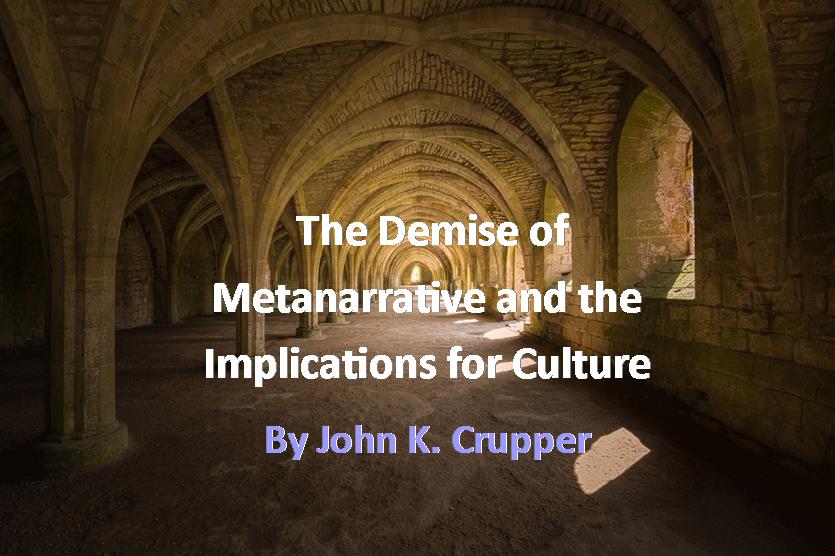The Demise of Metanarrative and the Implications for Culture
 Introduction
Introduction
“Simplifying in the extreme, I define postmodern as incredulity toward metanarratives.”1
“A massive intellectual revolution is taking place that is perhaps as great as that which marked off the modern world from the Middle Ages. The foundations of the modern world are collapsing, and we are entering a postmodern world. The principles forged during the Enlightenment (c. 1600-1780), which formed the foundations of the modern mentality, are crumbling.”2
The current situation, which is being referred to as postmodern, is intimately connected with the notion of metanarrative and its demise. Western civilization has, until recently shared a common story. This common story was not explicit, nor was it intentionally constructed. In the pre-modern period and in the modern period, Western civilization has held had a common story.
Such is no longer the case.
Definition
The word metanarrative is a compound word coming from the word “narrative” and the prefix “meta.” Narrative refers to story and meta has the meaning of “with, after, from”. Combined, they give the notion of going beyond the story. More familiar is the term metaphysics. Physics has to do the material composition of reality and its function. Metaphysics goes beyond physics to look at being or the essence of reality. It asks the questions such as “What is real?”, “What is ultimately real”?, and “What is man’s [sic] place in what is real?”3
Metanarratives are unifying stories that give shape to a culture.
Wikipedia, the online encyclopedia, defines metanarrative as follows:
A metanarrative can include any grand, all-encompassing story, classic text, or archetypal account of the historical record. They can also provide a framework upon which an individual’s own experiences and thoughts may be ordered. These grand, all-encompassing stories are typically characterized by some form of ‘transcendent and universal truth’ in addition to an evolutionary tale of human existence (a story with a beginning, middle and an end). The majority of metanarratives tend to be relatively optimistic in their visions for human kind, some verge on utopian, but different schools of thought offer very differing accounts.5
Note the terms “grand”, “all-encompassing”, “classic”, and “archetypal.” One cannot overestimate the unifying role and nature of metanarratives.
Metanarrative and Worldview
Do not confuse metanarrative with worldview.
Category: Living the Faith, Spring 2017


